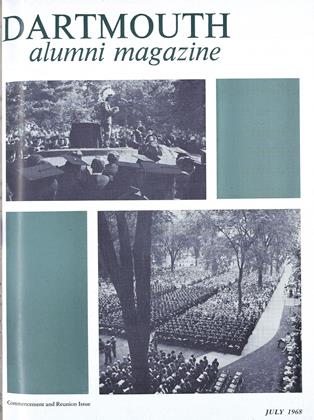THE STRUCTURE OF POLITICAL THOUGHT, A STUDY IN THE HISTORY OF POLITICAL IDEALS.
JULY 1968 VINCENT E. STARZINGERTHE STRUCTURE OF POLITICAL THOUGHT, A STUDY IN THE HISTORY OF POLITICAL IDEALS. VINCENT E. STARZINGER JULY 1968
ByCharles N. R. McCoy '32. New York:McGraw-Hill Company, Inc., 1963. 323pp. $5.95.
"Never before in history has life itself seemed so random a thing and existence so marginal and insecure." Father McCoy's essential argument is that we have reached this wasteland because the post-medieval western world has betrayed — first in philosophy and then in politics — the Aristotelian-Aquinian view of man and nature. By that view, man occupies "a center position between the condition of creator and the condition of nature" — a position from which human intellect can comprehend the moral ends of life and project those ends upon nature. That, in turn, gives man the possibility of freedom from both nature's blind necessity and manipulation by political charlatans. The author traces the betrayal of this classic view largely to what he calls theories of "autonomous natural law" which pervade modern liberalism, conservatism, and Marxism. By rejecting man's teleological moral purpose, these theories in effect reduce the human intellect to a mere datum of nature. Natural law itself becomes simply a description of nature, including the brute empirical behavior of man. With that, both natural law and modern political theory cease to be a standard by which society can identify or censure man's misbehavior.
This study illustrates dramatically how the history of political ideas, a subject too poorly regarded in political science of late, can help make some sense out of the world around us today. A problem of course is that the prescribed return to Aristotle and Aquinas cannot satisfy those, who are unable — for one reason or another — to accept the premise that there exists in the universe a "Prime Intellect by whose perfect freedom all things both are and are governed." One must accept that premise either with genuine conviction or not at all. To accept it pragmatically simply because the idea seems "useful" is surely to betray the premise itself — whether the terms of discourse are secular or theological. However, if rational argument is ever capable of turning the unconvinced toward genuine conviction, perhaps Father McCoy has made that kind of an argument. His style, his scholarship, his grounding in philosophy, and his overarching analysis are brilliant.
Mr. Starzinger is a member of the Department of Government, Dartmouth College.
 View Full Issue
View Full Issue
More From This Issue
-
 Feature
FeatureNon-Violent Change in Our Society
July 1968 By THE HON. JACOB K. JAVITS, LL.D. '68 -
 Feature
Feature"People as Well as Things"
July 1968 By HARVEY P. HOOD '18 -
 Feature
FeatureThe Senior Valedictory
July 1968 By JAMES WITTEN NEWTON '68 -
 Feature
FeatureHONORARY DEGREE CITATIONS
July 1968 -
 Feature
FeatureReunion Week: Fun Plus Education
July 1968 -
 Feature
FeatureCouncil Honors Three Alumni
July 1968
VINCENT E. STARZINGER
Books
-
 Books
BooksEDITOR’S PICKS
MAY | JUNE -
 Books
BooksGAIL BORDEN, RESOURCEFUL BOY.
OCTOBER 1965 By CLIFF JORDAN '45 -
 Books
BooksGROUND UNDER OUR FEET.
January 1939 By Earl R. Sikes -
 Books
BooksNEUROLOGY of the OCULAR MUSCLES
May 1948 By Hanford L. Auten '32. -
 Books
BooksDON ROBERTO
March 1931 By J. M. Arce -
 Books
BooksA Tortured Process
MAY 1983 By William N. Fenton '30



